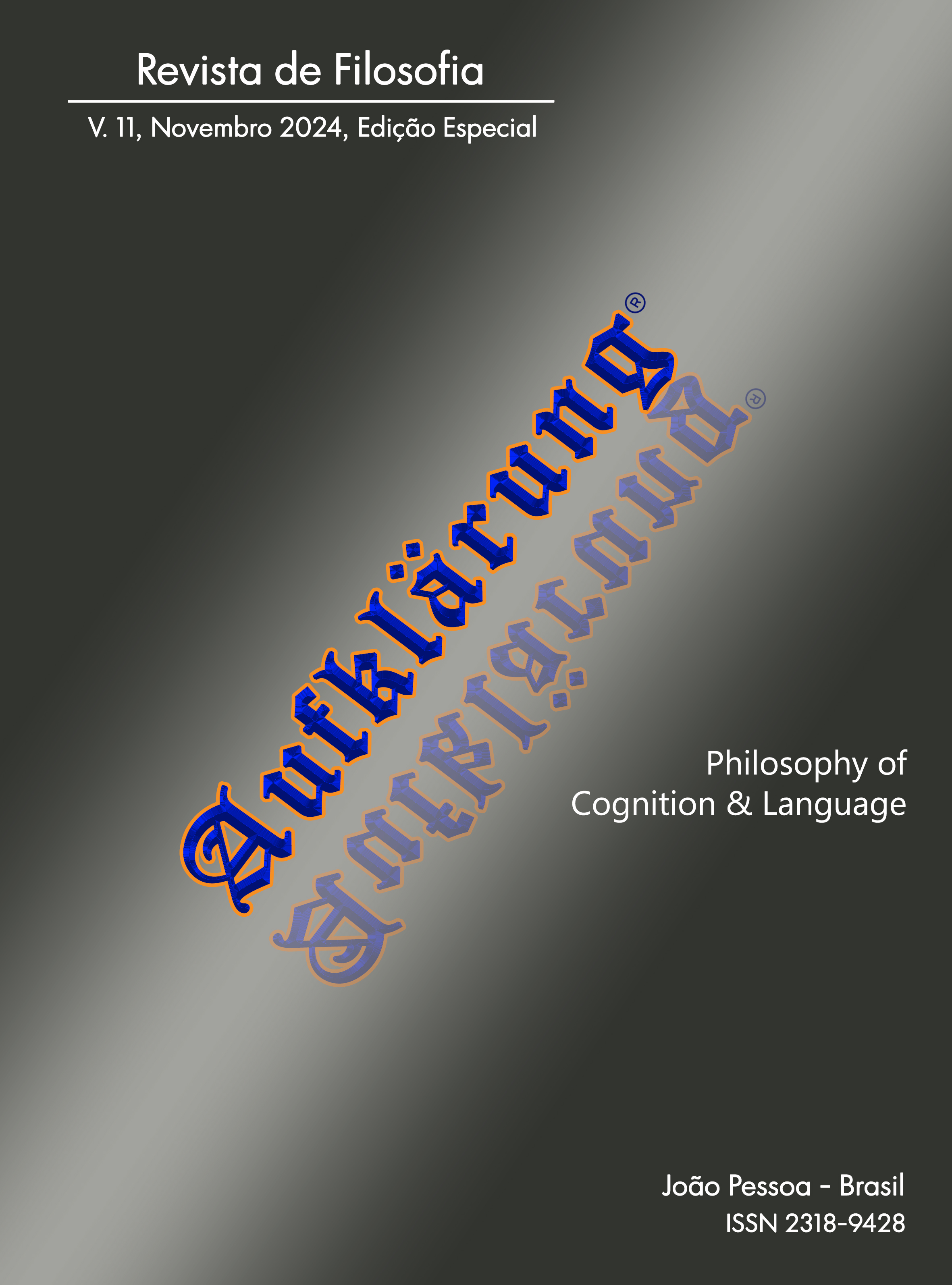The change of topic objection in Herman Cappelen’s austerity framework of conceptual engineering
DOI:
https://doi.org/10.18012/arf.v11iEspecial.70029Keywords:
Conceptual engineering; Conceptual ethics; Change of topic; Verbal disputes., Conceptual engineering, Conceptual ethics, Change of topic, Verbal disputesAbstract
This paper examines the change of subject problem in conceptual engineering, focusing on Herman Cappelen's austere approach. We present two versions of the problem: the verbal disputes objection and the content instability objection. We analyze how Cappelen addresses these objections using the notions of "topic" and "topic similarity". We argue that while his response to the verbal disputes objection is satisfactory, his approach fails to adequately deal with the content instability objection. Specifically, Cappelen does not provide sufficient resources to identify the incompatible content that grounds substantive disagreements in cases involving revised terms. We conclude that Cappelen's austere approach, despite its contributions, leaves important questions unanswered about how to characterize legitimate disagreements in conceptual engineering contexts.
Downloads
References
ABATH, A. J. Para velhas perguntas, novas e melhores respostas: da engenharia conceitual ao aprimoramento erotético. Trans/Form/Ação, v. 46, p. 103-134, 2023.
BELLERI, D. Downplaying the change of subject objection to conceptual engineering. Inquiry, ahead of print, p. 1-24, 2021.
BELLERI, D. “You’re changing the subject”: an unfair objection to conceptual engineering?. Philosophical quarterly, ahead of print, p. 1-24, abr, 2024.
BELLERI, D. Engenharia conceptual. In: SANTOS, R.; YATES, D. (Org.) Compêndio em Linha de Problemas de Filosofia Analítica. Lisboa: Universidade de Lisboa, 2022. p. 01-32.
CAPPELEN, H.; DEVER, J. Context and communication. Oxford: Oxford University Press, 2016.
CAPPELEN, H.; PLUNKETT, D. Introduction. Conceptual engineering and conceptual ethics. in: BURGESS, A.; CAPPELEN, H.; PLUNKETT, D. (Ed.) Conceptual engineering and conceptual ethics. Oxford: Oxford University Press, 2020. p. 01-34.
CAPPELEN, H. Conceptual engineering: the master argument. In: BURGESS, A.; CAPPELEN, H.; PLUNKETT, D. (Ed.) Conceptual engineering and conceptual ethics. Oxford: Oxford University Press, 2020. p. 132-151.
CAPPELEN, H. Fixing language. Oxford: Oxford University Press, 2018.
CARNAP, R. Logical foundations of probability. Chicago: University of Chicago Press, 1950.
CHALMERS, D. J. Verbal disputes. Philosophical Review, v. 120, p. 515-566, 2011.
CLARK, A.; CHALMERS, D. The extended mind. Analysis, v. 58, p. 7-19, 1998.
DORR, C.; HAWTHORNE, J. Semantic plasticity and speech reports. The Philosophical Review, v. 123, p. 281-338, 2014.
DOS SANTOS, C. Comentário a “Para velhas perguntas, novas e melhores respostas: da engenharia conceitual ao aprimoramento erotético”: de conceitos a perguntas, de perguntas a conceitos. Trans/Form/Ação, v. 46, p. 141-146, 2023.
EVANS, G. The causal theory of names. Aristotelian Society, v. 47, p. 187-225, 1973.
HASLANGER, S. Gender and race: (what) are they? (What) do we want them to be? Noûs, v. 34, p. 31-55, 2000.
ISAAC, M. G.; KOCH, S.; NEFDT, R. Conceptual engineering: A road map to practice. Philosophy Compass, v. 17, n. 10, p. 1-15, 2021.
HASLANGER, S. Going on, not in the same way: conceptual engineering and conceptual ethics. In: BURGESS, A.; CAPPELEN, H.; PLUNKETT, D. (Ed.) Conceptual engineering and conceptual ethics. Oxford: Oxford University Press, 2020. p. 230-260.
KNOLL, V. Topics, disputes and “going meta”. Inquiry, ahead of print, p. 1-29, 2021.
MOREIRA, F. G. A. Comentário a “Para velhas perguntas, novas e melhores respostas: da engenharia conceitual ao aprimoramento erotético”. Trans/Form/Ação, v. 46, p. 135-140, 2023.
PINDER, M. Conceptual engineering, metasemantic externalism and speaker-meaning. Mind, v. 130, p. 141-163, 2021.
PLUNKETT, D. Which concepts should we use? Metalinguistic negotiations and the methodology of philosophy. Inquiry, v. 58, p. 828-874, 2015.
PLUNKETT, D.; SUNDELL, T. Disagreement and the semantics of mormative and evaluative terms. Philosopher’s Imprint, v. 13, p. 1-37, 2013.
PLUNKETT, D.; SUNDELL, T. Metalinguistic negotiation and speaker error. Inquiry, v. 64, p. 142-167, 2021.
SAWYER, S. The role of concepts in fixing language. Canadian Journal of Philosophy, v. 50, p. 555-565, 2020.
SCHROETER, F.; SCHROETER, L; TOH, K. The limits of metalinguistic negotiation: the role of shared meanings in normative debate. Canadian Journal of Philosophy. v. 58, p. 180-196, 2022.
STRAWSON, P. F. Carnap’s views on conceptual systems versus natural languages in analytic philosophy. In: SCHILPP, P. A. (Ed.) The philosophy of Rudolf Carnap. La Salle, IL: Open Court, 1963. p. 503-518.
SUNDELL, T. Changing the subject. Canadian Journal of Philosophy, v. 50, p. 580-593, 2020.
VERMEULEN, I. Verbal disputes and the varieties of verbalness. Erkenntnis, v. 83, p. 331-348, 2017.
Additional Files
Published
How to Cite
Issue
Section
License

This work is licensed under a Creative Commons Attribution 4.0 International License.
Journal general policy
1.This journal works under a Creative Commons License aplied to online journals. That icence can be read in the following link: Creative Commons Attribution 4.0 International (CC BY 4.0).
2.Accordingly to this License, a)the journal declares that authors hold the copyright of their articles without restrictions, and they can archieve them as post-print elsewhere. b)the journal allow the author(s) to retain publishing rights without restrictions.
Metadata Policy for information describing items in the repository
1. Anyone may access the metadata free of charge at anytime.
2.The metadata may be re-used in any medium without prior permission, even commercial purposes provided the OAI Identifier or a link to the original metadata record are given, under the terms of a CC BY license refered for the Journal.







































